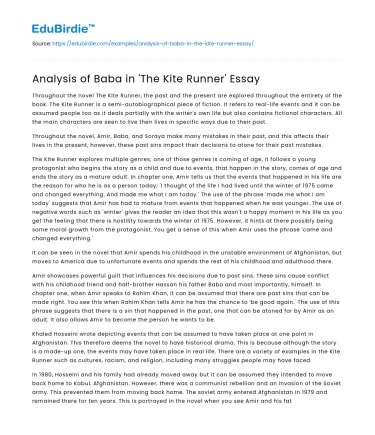Throughout the novel The Kite Runner, the past and the present are explored throughout the entirety of the book. The Kite Runner is a semi-autobiographical piece of fiction. It refers to real-life events and it can be assumed people too as it deals partially with the writer's own life but also contains fictional characters. All the main characters are seen to live their lives in specific ways due to their past.
Throughout the novel, Amir, Baba, and Soraya make many mistakes in their past, and this affects their lives in the present, however, these past sins impact their decisions to atone for their past mistakes.
Save your time!
We can take care of your essay
- Proper editing and formatting
- Free revision, title page, and bibliography
- Flexible prices and money-back guarantee
The Kite Runner explores multiple genres; one of those genres is coming of age, it follows a young protagonist who begins the story as a child and due to events, that happen in the story, comes of age and ends the story as a mature adult. In chapter one, Amir tells us that the events that happened in his life are the reason for who he is as a person today; 'I thought of the life I had lived until the winter of 1975 came and changed everything. And made me what I am today.' The use of the phrase 'made me what I am today' suggests that Amir has had to mature from events that happened when he was younger. The use of negative words such as 'winter' gives the reader an idea that this wasn't a happy moment in his life as you get the feeling that there is hostility towards the winter of 1975. However, it hints at there possibly being some moral growth from the protagonist. You get a sense of this when Amir uses the phrase 'came and changed everything.'
It can be seen in the novel that Amir spends his childhood in the unstable environment of Afghanistan, but moves to America due to unfortunate events and spends the rest of his childhood and adulthood there.
Amir showcases powerful guilt that influences his decisions due to past sins. These sins cause conflict with his childhood friend and half-brother Hassan his father Baba and most importantly, himself. In chapter one, when Amir speaks to Rahim Khan, it can be assumed that there are past sins that can be made right. You see this when Rahim Khan tells Amir he has the chance to 'be good again.' The use of this phrase suggests that there is a sin that happened in the past, one that can be atoned for by Amir as an adult. It also allows Amir to become the person he wants to be.
Khaled Hosseini wrote depicting events that can be assumed to have taken place at one point in Afghanistan. This therefore deems the novel to have historical drama. This is because although the story is a made-up one, the events may have taken place in real life. There are a variety of examples in the Kite Runner such as cultures, racism, and religion, including many struggles people may have faced.
In 1980, Hosseini and his family had already moved away but it can be assumed they intended to move back home to Kabul, Afghanistan. However, there was a communist rebellion and an invasion of the Soviet army. This prevented them from moving back home. The soviet army entered Afghanistan in 1979 and remained there for ten years. This is portrayed in the novel when you see Amir and his father Baba flee to America and remain there for the remainder of their lives.






 Stuck on your essay?
Stuck on your essay?

